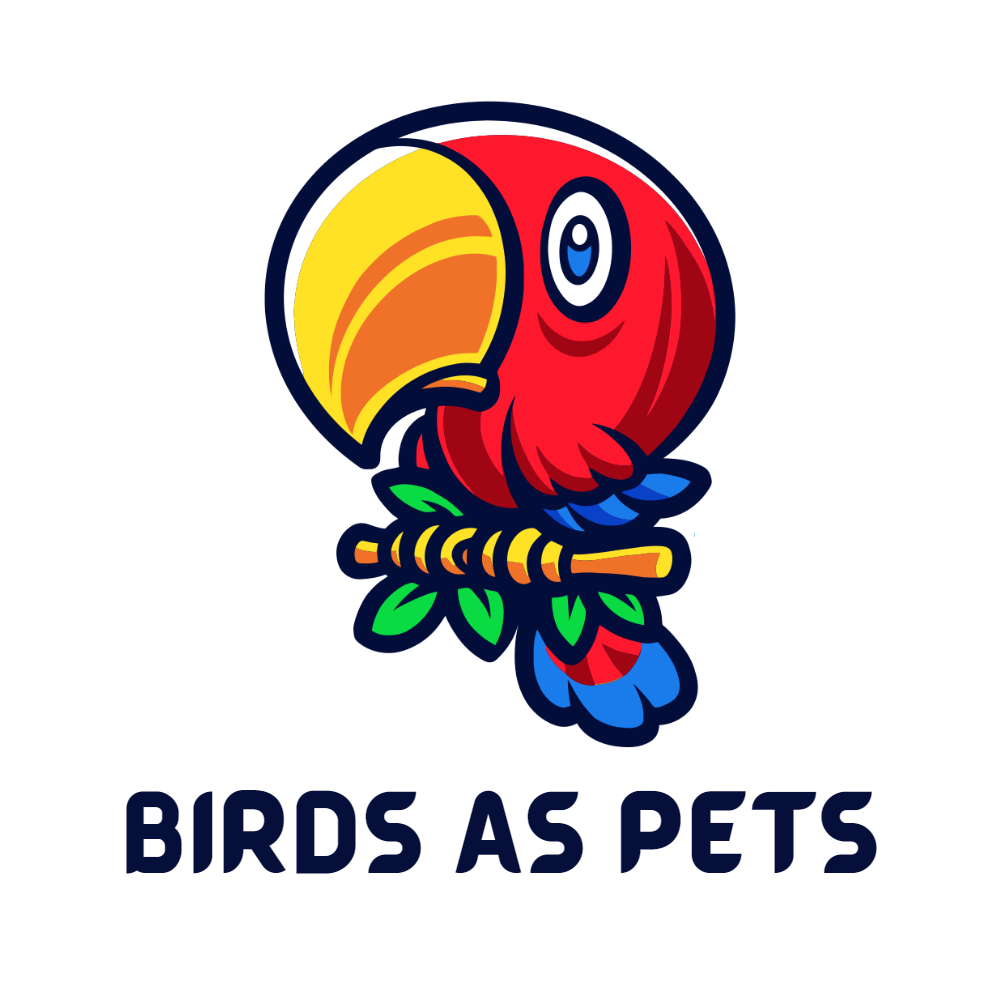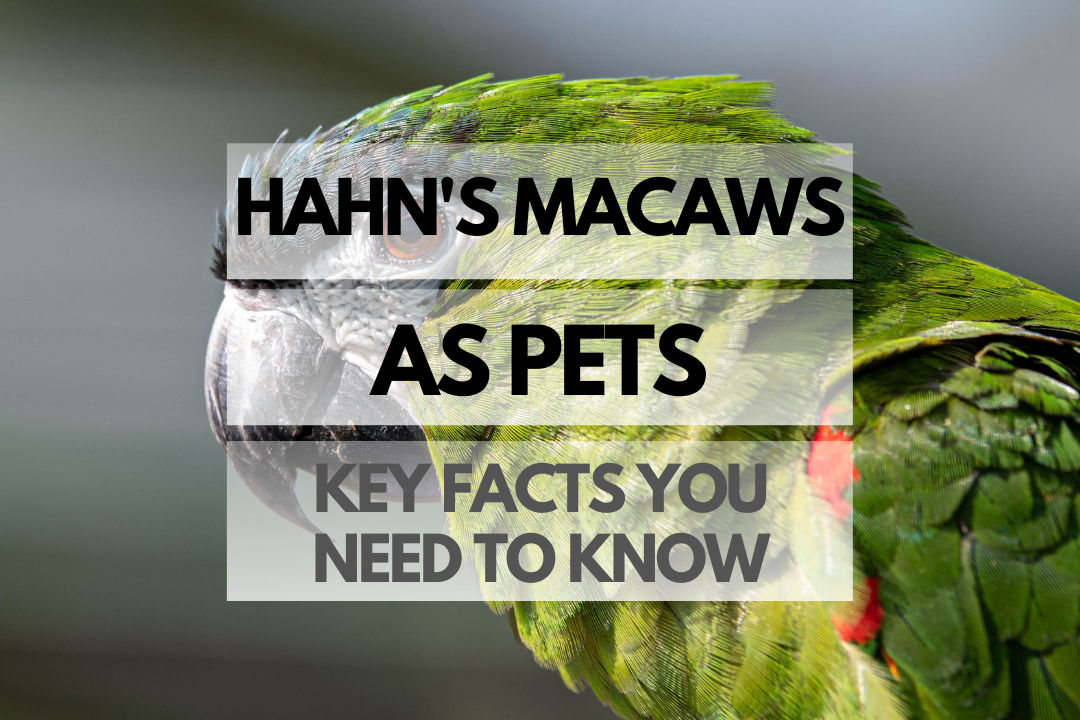If you’re considering adding a Hahn’s Macaw to your family, it’s essential to know what to expect. These intelligent and affectionate birds make wonderful companions, but they also require a significant commitment of time, energy, and resources. In this article, we’ll explore what you need to know about Hahn’s Macaws as pets, including their care requirements, lifespan, and more.
Quick Reference Table: Hahn’s Macaw Facts
| Fact | Details |
|---|---|
| Size | 12-14 inches (30-35 cm) from head to tail |
| Weight | 4.9-5.6 ounces (140-160 grams) |
| Color | Primarily green with red forehead, blue-tipped wings, and tail |
| Life Expectancy | 20-30 years |
| Noise Level | Moderate to loud |
| Talking Ability | Good, can learn a small vocabulary of words and phrases |
Where Do Wild Hahn’s Macaws Live?
Wild Hahn’s Macaws are native to South America, specifically the Amazon Basin. Their habitat includes tropical forests, savannas, and woodlands. They are social birds and can often be found in small groups or pairs, feeding on fruits, seeds, and nuts.
Hahn’s Macaw Lifespan: How Long Do They Live as Pets?
With proper care, Hahn’s Macaws can live 20-30 years as pets. To ensure a long, healthy life, provide them with a balanced diet, regular veterinary care, and a clean, stimulating environment. Owning a Hahn’s Macaw is a long-term commitment, so be prepared for the time and dedication required to care for them throughout their lives.
Are Hahn’s Macaws Good Pets?
Hahn’s Macaws can make excellent pets for the right person. They are intelligent, affectionate, and entertaining, known for their playful antics and strong bond with their owners. However, they can also be loud and demanding, requiring a significant amount of time and attention. If you’re willing to put in the effort, a Hahn’s Macaw can be a rewarding and delightful companion.
Are Hahn’s Macaws as Pets Good for Beginners?
While Hahn’s Macaws are smaller and often easier to manage than some larger parrot species, they still require a dedicated and knowledgeable owner. They may not be the best choice for a first-time bird owner, but if you’re prepared to put in the time and effort to educate yourself and provide the necessary care, a Hahn’s Macaw could be a suitable pet.
Are Hahn’s Macaws Easy to Care For?
Hahn’s Macaws have specific care requirements, including a balanced diet, regular grooming, and an appropriate living environment. They also need plenty of mental stimulation, social interaction, and exercise to thrive. While they may not be as challenging as larger parrots, Hahn’s Macaws still require a significant amount of care and attention.
Hahn’s Macaw Pros and Cons
| Pros | Cons |
|---|---|
| Affectionate and intelligent | Can be loud and noisy |
| Smaller size makes them easier to manage | Not ideal for first-time bird owners |
| Good talking ability | Requires a significant time commitment |
| Playful and entertaining | Potential for destructive behavior if not properly stimulated |
Hahn’s Macaw Price and Costs
The initial cost of a Hahn’s Macaw can range from $800 to $2,000, depending on factors like age, breeder reputation, and whether the bird is hand-tamed. In addition to the purchase price, you’ll need to budget for initial setup costs, such as a cage, toys, and accessories. Ongoing expenses include food, veterinary care, and replacement toys or cage items.
Where to Buy Hahn’s Macaws
When looking for a Hahn’s Macaw, it’s essential to find a reputable breeder or rescue organization. A good breeder should be knowledgeable about the species, provide a clean and healthy environment for the birds, and be willing to answer any questions you have. You can also check with local bird clubs, avian veterinarians, or online forums for recommendations.
Caring for Hahn’s Macaws
Proper care is crucial for the health and well-being of your Hahn’s Macaw. This includes providing a balanced diet, a safe and stimulating environment, and regular veterinary care.
Hahn’s Macaw Food
A balanced diet is essential for your Hahn’s Macaw’s health. Offer a variety of fresh fruits, vegetables, and high-quality pellets formulated for parrots. You can also include small amounts of nuts and seeds as treats. Avoid feeding your bird chocolate, avocado, or foods high in salt or sugar, as these can be harmful to their health.
Health and Common Issues
Like any bird, Hahn’s Macaws can be susceptible to certain health issues. Some common problems include feather plucking, respiratory infections, and digestive issues. Regular veterinary check-ups can help identify and treat any health concerns early on.
Signs of Healthy Hahn’s Macaws
| Healthy Hahn’s Macaw | Sick Hahn’s Macaw |
|---|---|
| Bright, clear eyes | Cloudy or swollen eyes |
| Smooth, well-groomed feathers | Ruffled, plucked, or dirty feathers |
| Active and alert | Lethargic or unresponsive |
| Strong appetite | Loss of appetite or weight loss |
| Normal droppings | Abnormal droppings, such as diarrhea or unusual color |
Hahn’s Macaw Pet Insurance
Investing in pet insurance for your Hahn’s Macaw can help cover unexpected veterinary costs and give you peace of mind. Look for insurance policies specifically designed for exotic birds, which may cover accidents, illnesses, and routine veterinary care. Be sure to read the policy terms and conditions carefully to ensure your Hahn’s Macaw’s specific needs are covered.
Personality and Behavior
Hahn’s Macaws are known for their playful and affectionate personalities. They tend to form strong bonds with their owners and enjoy spending time with their human family members. These intelligent birds are capable of learning tricks and can be quite entertaining. Keep in mind, though, that Hahn’s Macaws can be loud and may demand a lot of attention.
Are Hahn’s Macaws Social?
Yes, Hahn’s Macaws are social birds that thrive on interaction with their owners and other birds. They require regular socialization and mental stimulation to prevent boredom and behavioral issues. Ensure you can dedicate enough time and energy to interact with your Hahn’s Macaw each day and provide a stimulating environment to keep them happy and healthy.
Speech and Noise of Hahn’s Macaws
Hahn’s Macaws have a decent ability to mimic speech, and they can learn a small vocabulary of words and phrases. Along with their talking abilities, they can also be quite noisy, producing a range of screeches and squawks. This noise level may not be suitable for all living situations, especially in apartments or close quarters with neighbors.
Similar Species to Hahn’s Macaws
Similar species to Hahn’s Macaws include other members of the Mini-Macaw group, such as the Severe Macaw, Yellow-collared Macaw, and Illiger’s Macaw. These birds share similar physical features and behaviors, but each species has its unique traits and care requirements. If you’re considering a Hahn’s Macaw, it’s a good idea to research other Mini-Macaws to find the best fit for your lifestyle and experience level.
Can Hahn’s Macaws Live With Other Pets and Birds?
While Hahn’s Macaws may get along with other birds, especially other Mini-Macaws, it’s essential to monitor interactions closely and provide separate living spaces to prevent territorial disputes. As for other pets, such as dogs or cats, always supervise interactions and ensure that your Hahn’s Macaw is safe from potential harm.
Are Hahn’s Macaws Legal to Have as Pets?
In most countries, including the United States, Hahn’s Macaws are legal to own as pets. However, it’s crucial to research your local laws and regulations, as some areas may have restrictions on exotic birds or require special permits. Always ensure that your Hahn’s Macaw is captive-bred and not taken from the wild, as this is illegal and harmful to wild populations.
Additional Resources
Here are some real resources that can help you learn more about Hahn’s Macaws and their care:
- Books: “Mini Macaws: A Complete Pet Owner’s Manual” by Werner Lantermann
- Forums: Avian Avenue (www.avianavenue.com)
- Scientific Articles: “The Miniature Macaws” by Rosemary Low, in PsittaScene Magazine by the World Parrot Trust
FAQ for Hahn’s Macaws as Pets
Do Hahn’s Macaws talk?
Yes, Hahn’s Macaws have a reasonable ability to mimic speech and can learn a small vocabulary of words and phrases.
Are Hahn’s Macaws suitable for families with young kids?
While Hahn’s Macaws can be friendly and affectionate, their noise level and potential for nipping may not make them the best choice for families with young kids. It’s essential to teach children how to interact with the bird respectfully and always supervise interactions.
Can Hahn’s Macaws be trained?
Yes, Hahn’s Macaws are intelligent and can be trained to perform tricks and learn commands. Positive reinforcement training is the most effective method for teaching them new behaviors.
How do I know what gender Hahn’s Macaws are?
Determining the gender of Hahn’s Macaws can be difficult, as they are not sexually dimorphic. The most accurate method fordetermining their gender is through DNA testing, which can be done by a veterinarian using a blood sample or feather plucking.
What is the average lifespan of Hahn’s Macaws?
Hahn’s Macaws have an average lifespan of 20-30 years, although some individuals may live even longer with proper care. Providing a balanced diet, regular veterinary care, and a stimulating environment can contribute to your Hahn’s Macaw’s overall health and longevity.
What should I feed my Hahn’s Macaw?
A balanced diet is essential for your Hahn’s Macaw’s health. Provide a mix of high-quality pellets, fresh fruits, vegetables, and occasional seeds and nuts. Make sure to research safe and toxic foods for Hahn’s Macaws and consult with your avian veterinarian about specific dietary needs.
How big of a cage does a Hahn’s Macaw need?
Hahn’s Macaws require a spacious cage to move around and stretch their wings comfortably. A cage measuring at least 24 inches wide, 24 inches deep, and 36 inches tall is recommended, with bar spacing of no more than 1 inch. Include perches, toys, and enrichment items to keep your Hahn’s Macaw entertained and stimulated.

